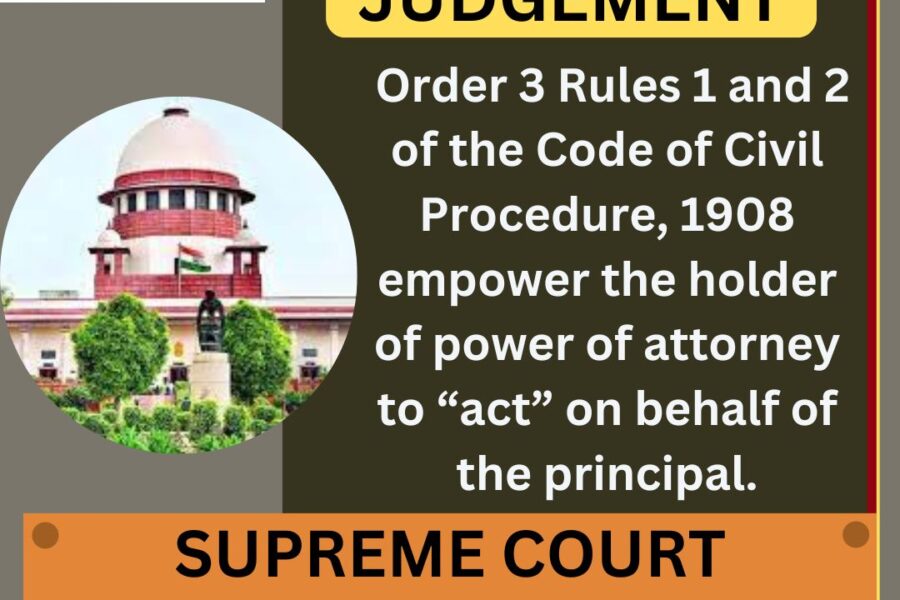Janki Vashdeo Bhojwani & Anr. V. Indsind Bank Ltd.
Civil Appeal No.6790 of 2003
The Hon’ble Supreme Court held that a power-of-attorney holder, who has acted in pursuance of the said power, may depose on behalf of the principal in respect of such acts but cannot depose for the principal for the acts done by the principal and not by the power-of-attorney holder. Likewise, the power-of-attorney holder cannot depose for the principal in respect of matters of which the principal alone can have personal knowledge and in respect of which the principal is entitled to be cross-examined. In our opinion, the failure of the respondent to appear in the witness box can well be considered to raise an adverse presumption against him.
Case Brief
Plot No.38, Koregaon Park, Pune was motgagaed to the bank.The respondent Bank filed a suit against the 2nd respondent and the 7th respondent, OA NO.159-P of 2001 before DRT for the recovery of a sum of Rs 3.86 crores. The appeallants are neither debtors nor gurantors and, therefore, the propertt in question to the extent of their share in the property could not have been sold in the execution of the decree. The parties have filed objections to the finding.
Subject :
(i) Order 3 Rules 1 and 2 CPC- Whether the word “acts” employed in Order 3 Rule 1 and 2 CPC would include deposing in place of and instead of the principal ?
- If the power of attorney holder has rendered some “acts” in pursuance of power of attorney, he may depose for the principal in respect of such acts, but he cannot depose for the principal for the acts done by the principal and not by him.
(ii) Whether power of attorney holder can depose for principal in respect of matters of which only principal can have personal knowledge and in respect of which only principal is liable to be cross-examined ?
- Similarly, he cannot depose for the principal in respect of the matter of which only the principal can have a personal knowledge and in respect of which the principal is entitled to be cross-examined.
Honourable Supreme Court of India has held that Order 3 Rules 1 and 2 of the Code of Civil Procedure, 1908 empower the holder of power of attorney to “act” on behalf of the principal.
It is held that the word “acts” as used in Order 3 Rules 1 and 2 CPC only refers to “acts” carried out by the person holding the power of attorney while using the authority granted by the document. Deposing in lieu of and instead of the principal would not be included in the definition of “acts.” It is decided that the holder of the power of attorney cannot testify on behalf of the principle for actions taken by the principal and not by him.
In the context of the directions given by this Court, shifting the burden of proving on to the appellants that they have a share in the property, it was obligatory on the appellants to have entered the box and discharged the burden by themselves. The question whether the appellants have any independent source of income and have contributed towards the purchase of the property from their own independent income can be only answered by the appellants themselves and not by a mere holder of power of attorney from them. The power-of-attorney holder does not have personal knowledge of the matter of the appellants and therefore he can neither depose on his personal knowledge nor can he be cross-examined on those facts which are to the personal knowledge of the principal.
The Court noted the decision ShambhuDuttShastri v. State of Rajasthan [(1986) 2 WLN 713 (Raj)] it was held that a general power-of-attorney holder can appear, plead and act on behalf of the party but he cannot become a witness on behalf of the party. He can only appear in his own capacity. No one can delegate the power to appear in the witness box on behalf of himself. To appear in a witness box is altogether a different act. A general power-of-attorney holder cannot be allowed to appear as a witness on behalf of the plaintiff in the capacity of the plaintiff.
However, in the case of Humberto Luis v. Floriano Armando Luis [(2002) 2 Bom CR 754] on which reliance has been placed by the Tribunal in the present case, the High Court took a dissenting view and held that the provisions contained in Order 3 Rule 2 CPC cannot be construed to disentitle the power-of-attorney holder to depose on behalf of his principal. The High Court further held that the word “act” appearing in Order 3 Rule 2 CPC takes within its sweep “depose”. We are unable to agree with this view taken by the Bombay High Court in Floriano Armando [(2002) 2 Bom CR 754]


A pharmacy that truly understands customer service.
where buy lisinopril without rx
I’m always informed about potential medication interactions.